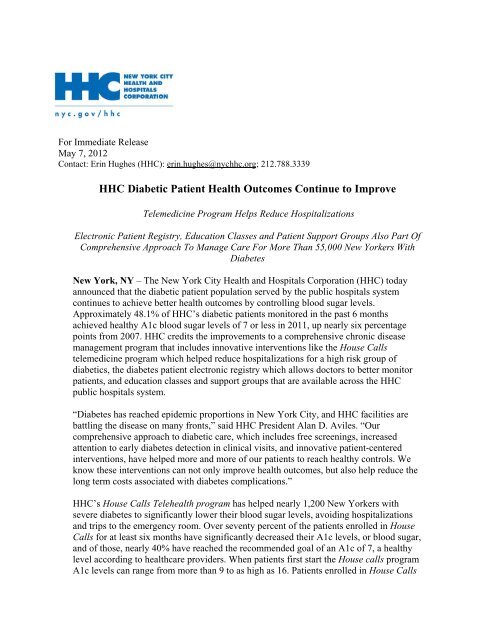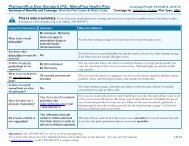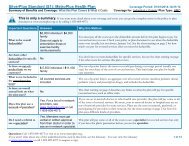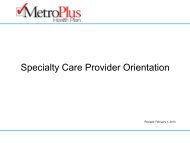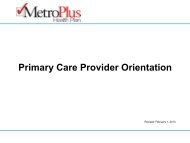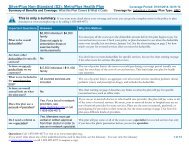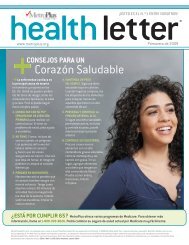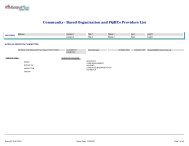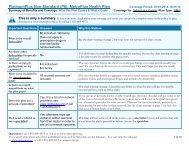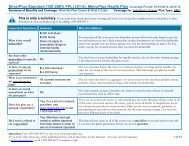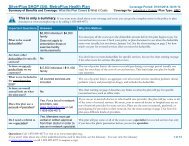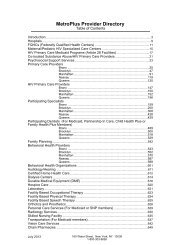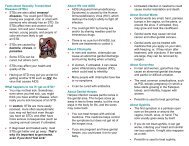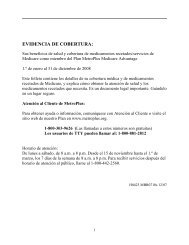HHC Diabetic Patient Health Outcomes Continue to Improve
HHC Diabetic Patient Health Outcomes Continue to Improve
HHC Diabetic Patient Health Outcomes Continue to Improve
Create successful ePaper yourself
Turn your PDF publications into a flip-book with our unique Google optimized e-Paper software.
For Immediate ReleaseMay 7, 2012Contact: Erin Hughes (<strong>HHC</strong>): erin.hughes@nychhc.org; 212.788.3339<strong>HHC</strong> <strong>Diabetic</strong> <strong>Patient</strong> <strong>Health</strong> <strong>Outcomes</strong> <strong>Continue</strong> <strong>to</strong> <strong>Improve</strong>Telemedicine Program Helps Reduce HospitalizationsElectronic <strong>Patient</strong> Registry, Education Classes and <strong>Patient</strong> Support Groups Also Part OfComprehensive Approach To Manage Care For More Than 55,000 New Yorkers WithDiabetesNew York, NY – The New York City <strong>Health</strong> and Hospitals Corporation (<strong>HHC</strong>) <strong>to</strong>dayannounced that the diabetic patient population served by the public hospitals systemcontinues <strong>to</strong> achieve better health outcomes by controlling blood sugar levels.Approximately 48.1% of <strong>HHC</strong>’s diabetic patients moni<strong>to</strong>red in the past 6 monthsachieved healthy A1c blood sugar levels of 7 or less in 2011, up nearly six percentagepoints from 2007. <strong>HHC</strong> credits the improvements <strong>to</strong> a comprehensive chronic diseasemanagement program that includes innovative interventions like the House Callstelemedicine program which helped reduce hospitalizations for a high risk group ofdiabetics, the diabetes patient electronic registry which allows doc<strong>to</strong>rs <strong>to</strong> better moni<strong>to</strong>rpatients, and education classes and support groups that are available across the <strong>HHC</strong>public hospitals system.“Diabetes has reached epidemic proportions in New York City, and <strong>HHC</strong> facilities arebattling the disease on many fronts,” said <strong>HHC</strong> President Alan D. Aviles. “Ourcomprehensive approach <strong>to</strong> diabetic care, which includes free screenings, increasedattention <strong>to</strong> early diabetes detection in clinical visits, and innovative patient-centeredinterventions, have helped more and more of our patients <strong>to</strong> reach healthy controls. Weknow these interventions can not only improve health outcomes, but also help reduce thelong term costs associated with diabetes complications.”<strong>HHC</strong>’s House Calls Telehealth program has helped nearly 1,200 New Yorkers withsevere diabetes <strong>to</strong> significantly lower their blood sugar levels, avoiding hospitalizationsand trips <strong>to</strong> the emergency room. Over seventy percent of the patients enrolled in HouseCalls for at least six months have significantly decreased their A1c levels, or blood sugar,and of those, nearly 40% have reached the recommended goal of an A1c of 7, a healthylevel according <strong>to</strong> healthcare providers. When patients first start the House calls programA1c levels can range from more than 9 <strong>to</strong> as high as 16. <strong>Patient</strong>s enrolled in House Calls
have also seen an 8% decrease in hospitalizations and a 6% reduction in ER visits. Theprogram, which is available <strong>to</strong> patients enrolled in the MetroPlus health plan, costs about$3,600 a year per patient, less than the cost of a single hospitalization which isapproximately $7,200.“These results encourage us <strong>to</strong> continue offering this great alternative <strong>to</strong> our MetroPlusmembers as part of our case management services,” said Dr. Arnold Saperstein,MetroPlus CEO. “Our main goal as a public health plan is <strong>to</strong> offer the bestcomprehensive services available <strong>to</strong> improve the health and quality of life for all of ourmembers. We are proud <strong>to</strong> be at the forefront of this battle, helping diabetic members <strong>to</strong>gain control over their health and live healthy lives.”House Calls Telehealth ProgramThe <strong>HHC</strong> House Calls program teaches people with diabetes <strong>to</strong> manage their owntreatment by electronically transmitting via modem, the daily blood sugar readings takenby patients in their homes, <strong>to</strong> a team of nurse case managers. <strong>Patient</strong>s are provided withthe equipment that connects <strong>to</strong> a telephone modem the size of a flip phone that is easilyplugged in at home. The equipment is then used <strong>to</strong> measure blood sugar and sometimesweight, and blood pressure. These readings are then transmitted <strong>to</strong> the House Callsnurses with the push of a but<strong>to</strong>n via the program's <strong>to</strong>ll free phone line. Readings that areoutside acceptable levels trigger au<strong>to</strong>matic alerts and clinicians then work <strong>to</strong> guide thepatient back <strong>to</strong> controlled levels before a health crisis occurs. House Calls also helpspatients design weekly meal plans and develop strategies <strong>to</strong> control their weight, bloodsugar, blood pressure and cholesterol. The program is available at no cost <strong>to</strong> diabeticpatients enrolled in MetroPlus, <strong>HHC</strong>'s insurance plan, if their blood tests indicate poorself management of their disease and are referred by their doc<strong>to</strong>r.<strong>Patient</strong> E-RegistrySince 2006, <strong>HHC</strong> has been moni<strong>to</strong>ring its 58,000 diabetic patients with its diabetic e-registry, a web-based <strong>to</strong>ol that uses information from <strong>HHC</strong>'s advanced electronic medicalrecords data and provides a real-time "snapshot" of ongoing patient care—blood sugarlevels, medications prescribed, even data about necessary eye tests and foot exams. Theinformation enables doc<strong>to</strong>rs <strong>to</strong> give more targeted, evidence-based treatment and makespossible better-controlled blood sugar, blood pressure and cholesterol levels. This works<strong>to</strong> reduce the risk of such severe complications as heart trouble, blindness and kidneyfailure.Education Classes and Support GroupsDiabetes educational courses and support groups are offered <strong>to</strong> all <strong>HHC</strong> patients withdiabetes, their families and care partners. <strong>Patient</strong>s who attend the classes receiveinstruction from certified diabetes educa<strong>to</strong>rs on healthy behaviors using the AmericanAssociation of Diabetes Educa<strong>to</strong>rs Self-Care Behaviors Framework. <strong>Patient</strong>s in thecourses develop the skills <strong>to</strong> take control of their diabetes and learn things like healthy
eating habits, exercise routines, proper moni<strong>to</strong>ring, medication compliance and healthycoping. <strong>HHC</strong> facilities also offer WeCOACH, a six-week exercise and wellness programthat helps patients who are over 60 years old and who have uncontrolled diabetesparticipate in easy, accessible, senior-focused exercise and wellness programs in theirown community. Peer Coaches are assigned <strong>to</strong> help guide patients in their diabetesmanagement. WeCOACH is offered at Jacobi, North Central Bronx and LincolnHospitals.Online Diabetes Wellness Center<strong>HHC</strong>’s online Diabetes Wellness Center has been a one s<strong>to</strong>p shop for diabetic patients,providing them with general information, nutritional and exercise tips and information onother <strong>HHC</strong> diabetes programs. <strong>Patient</strong>s can learn more about what causes diabetes, whatcan be done <strong>to</strong> treat its effects, read s<strong>to</strong>ries of how other <strong>HHC</strong> diabetic patients haveadopted healthier lifestyles, and learn from <strong>HHC</strong> experts about the most important things<strong>to</strong> focus on <strong>to</strong> successfully manage diabetes.About <strong>HHC</strong>The New York City <strong>Health</strong> and Hospitals Corporation (<strong>HHC</strong>) is a $6.7 billion integratedhealthcare delivery system with its own 420,000 member health plan, MetroPlus, and isthe largest municipal healthcare organization in the country. <strong>HHC</strong> serves 1.3 million NewYorkers every year and more than 475,000 are uninsured. <strong>HHC</strong> provides medical, mentalhealth and substance abuse services through its 11 acute care hospitals, four skillednursing facilities, six large diagnostic and treatment centers and more than 70 communitybased clinics. <strong>HHC</strong> <strong>Health</strong> and Home Care also provides in-home services for NewYorkers. <strong>HHC</strong> was the 2008 recipient of the National Quality Forum and The JointCommission's John M. Eisenberg Award for Innovation in <strong>Patient</strong> Safety and Quality.For more information, visit www.nyc.gov/hhc.About MetroPlusMetroPlus <strong>Health</strong> Plan, Inc. is a health services plan certified under Section 4403-a of theNew York Public <strong>Health</strong> Law and a wholly-owned subsidiary of the New York City<strong>Health</strong> and Hospitals Corporation (<strong>HHC</strong>), the largest municipal healthcare organizationin the country, MetroPlus provides managed care <strong>to</strong> over 420,000 eligible people livingin Manhattan, Brooklyn, the Bronx and Queens. In addition <strong>to</strong> Medicaid Managed Care,MetroPlus offers Child <strong>Health</strong> Plus, Family <strong>Health</strong> Plus and several Medicare AdvantagePlans and a Special Needs Plan (SNP) for people with HIV and their families. Inoperation for more than 25 years, MetroPlus offers a vast network of primary caredoc<strong>to</strong>rs and specialists, including many independent community providers. Plan staff isdrawn from the communities that MetroPlus serves and speaks more than seventylanguages.


